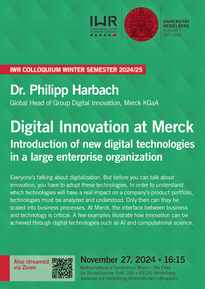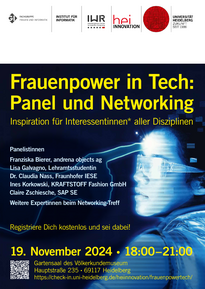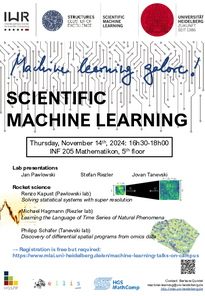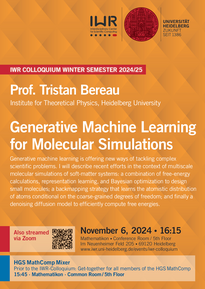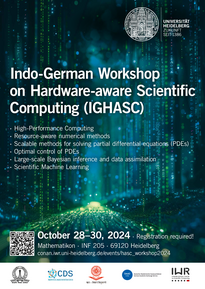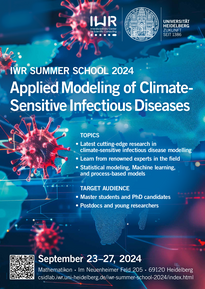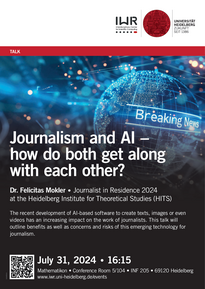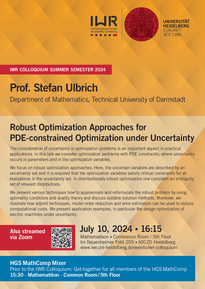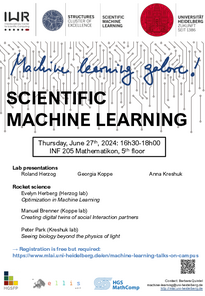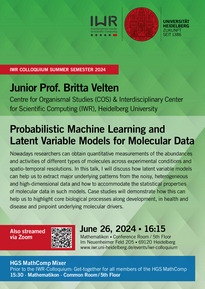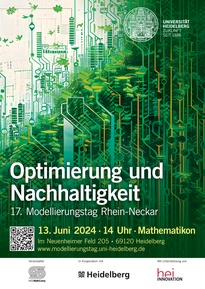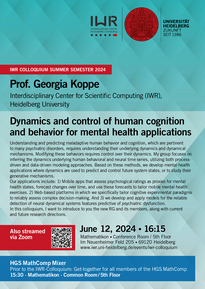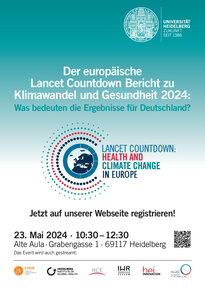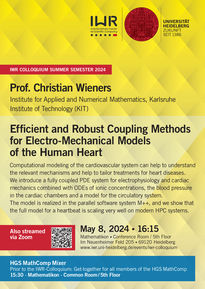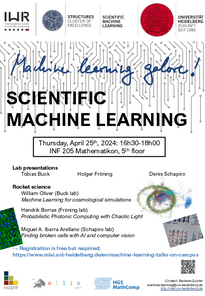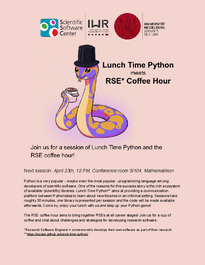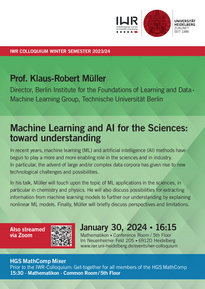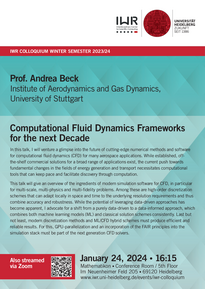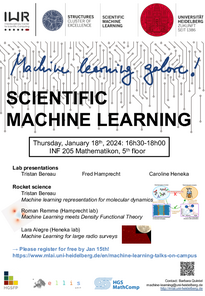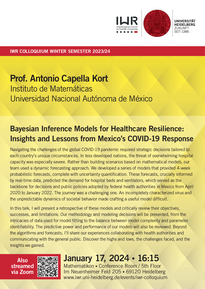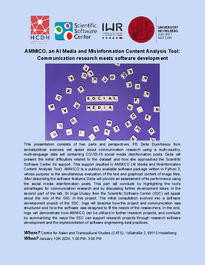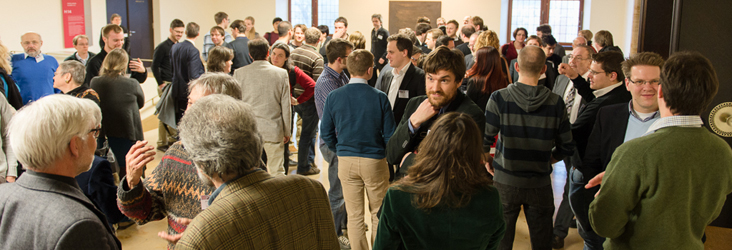
Events 2024
The Interdisciplinary Center for Scientific Computing (IWR) and its affiliated institutions organize a large number of workshops, conferences and other events for discussing latest scientific results as well as identifing upcoming challenges in the field of Scientific Computing. In addition the IWR regularly hosts events which emphasis on broadening and improving the interdisciplinary dialogue.
IWR Colloquium Winter Semester 2024 / 2025
"Digital Innovation at Merck – Introduction of new digital technologies in a large enterprise organization"
Dr. Philipp Harbach • Global Head of Group Digital Innovation, Merck KGaA
November 27, 2024 • 16:15
Everyone's talking about digitalization. But before you can talk about innovation, you have to adopt these technologies. In order to understand which technologies will have a real impact on a company's product portfolio, technologies must be analyzed and understood. Only then can they be scaled into business processes. At Merck, the interface between business and technology is critical. A few examples illustrate how innovation can be achieved through digital technologies such as AI and computational science.
The IWR Colloquium will be held as an in-person event at the Mathematikon. In addition it will be streamed via Zoom. For more information please visit the website of the colloquium.
Location: Mathematikon • Conference Room, Room 5/104, 5th Floor • Im Neuenheimer Feld 205 • 69120 Heidelberg
"Frauenpower in Tech: Panel und Networking"
19. November 2024 • 18:00 - 21:00 Uhr
Ist die IT-Welt ein integraler Bestandteil deines Alltags? Hast du den Wunsch, die digitale Zukunft aktiv mitzugestalten und suchst nach Inspiration? Lerne beeindruckende Frauen kennen, die aus unterschiedlichsten Bereichen in die IT eingestiegen sind und dort spannende Projekte machen. Lass Dich durch ihre Geschichten, Herausforderungen und Erfahrungen inspirieren und dir helfen, den richtigen Weg für dich zu finden! Dafür gibt es nach dem Panel noch ein informelles Networking bei kleinen Snacks.
Moderation:
Prof. Dr. Barbara Paech, Software Engineering, Universität Heidelberg
SprecherInnen:
Quereinstieg
- Kerstin Lambert, Digitalisierungsmanagerin, EPPLE GmbH
- Eda Özsahin, IT-Projektkeiterin
- Claire Zschiesche, Ausbildungsleitung Informatik, SAP SE (Panel)
- Sibylle Hofmeyer, PR-Beraterin, Hofmeyer PR
MINT-Studium, IT-Firma
- Franziska Bierer, Vorstand, andrena objects ag (Panel)
- Dominique Cheray, Projektleiterin und Softwareentwicklerin HMS Analytical Software GmbH
Lehramt
- Lisa Galvagno, Studienrätin und Studierende im Erweiterungsfachmaster Informatik (Geographie, Politik, Wirtschaft, Informatik) (Panel)
- Prof. Dr. Claudia Hildebrandt, CZS Stiftungsprofessur für Informatik und ihre Didaktik, Pädagogische Hochschule Heidelberg, Heidelberg School of Education
Firmengründung
- Ines Korkowski, Gründerin und Geschäftsführerin KRAFTSTOFF Fashion GmbH (Panel)
- Dr. Monika Pobiruchin, Hochschule Heilbronn und Colorful Bytes UG
Wissenschaft
- Dr. Claudia Nass, Expert Cross-Disciplinary Requirements Engineering, Fraunhofer Institut (Panel)
- Prof. Dr. Barbara Paech und Prof. Dr. Claudia Hildebrandt
Es laden ein: heiInnovation, Institut für Informatik, IWR, GI Fachgruppe Frauen und Informatik
Registriere Dich kostenlos und sei dabei!
Ort: Gartensaal, Völkerkundemuseum • Hauptstrasse 235, 69117 Heidelberg
88. Heidelberger Bildverarbeitungsforum
"KI für Bildsensorik"
19. November 2024 • Universität Siegen
Methoden maschinellen Lernens erreichen auch die Bildsensorik, Auswahl und Design von Bildaufnahmeverfahren.
Mit dem Schwerpunktthema „KI für Bildsensorik“ wird eine Zwischenbilanz gezogen:
- Wo stehen wir?
- Was eignet sich schon für die industrielle Praxis?
- Was sind die Perspektiven?
Für das Schwerpunktthema konnte das Zentrum für Sensorsysteme (ZESS) der Universität Siegen als lokaler Gastgeber gewonnen werden, an dem die Time-of-Flight Sensorik durch Prof. Schwarte erfunden wurde. Mit dem Forum sollen auch Kontakte zwischen der hauptsächlich in Südwestdeutschland lokalisierten Bildverarbeitungsindustrie und Institutionen wie dem ZESS in Nordrhein-Westfalen gefördert werden.
Eine Besichtigung des ZESS mit seinen vielfältigen Forschungsarbeiten und Austausch mit den Wissenschaftlern des ZESS und der lokalen Industrie ist daher Bestandteil des Programms. Die Mittagspause mit der begleitenden Ausstellung und Postern bietet weitere vielfältige Informations- und Gesprächsmöglichkeiten.
Anmeldung und weiterführende Informationen finden sich auf der Webseite der Veranstaltung:
https://www.bv-forum.de/88-bildverarbeitungsforum.html
"Machine learning galore!"
November 14, 2024 • 16:30 - 18:00
Machine learning galore will feature lab presentations by PIs as well as scientific talks by junior scientists.
- Lab presentations:
- Jan Pawlowski, Stefan Riezler, Jovan Tanevski
- Science talks:
- Renzo Kapust (Pawlowski lab) : Solving statistical systems with super resolution
- Michael Hagmann (Riezler lab) : Learning the Language of Time Series of Natural Phenomena
- Philipp Schäfer (Tanevski lab): Discovery of differential spatial programs from omics data
To help plan the catering, please register for free by clicking here. (Deadline: November 11, 2024)
Scientific Machine Learning is a joint initiative from STRUCTURES and IWR aimed at fostering interactions within and development of the local machine learning community. Its portal, http://mlai.uni-heidelberg.de summarizes the many relevant events and news from across campus that would otherwise remain scattered across single institutions or fields.
The goals of the MLAI platform align with the STRUCTURES Cluster of Excellence's objective of driving research into the fundamental understanding of current and future machine learning, and with IWR’s aim to leverage machine learning to enable the solution of long-standing problems in the natural and life sciences, the engineering sciences, as well as the humanities.
Further information and links:
- MLAI homepage
- Machine Learning Talks on Campus – Information service and mailing list
- STRUCTURES Cluster of Excellence
Location: Mathematikon • Conference Room, Room 5/104, 5th Floor • Im Neuenheimer Feld 205 • 69120 Heidelberg
IWR Colloquium Winter Semester 2024 / 2025
"Generative Machine Learning for Molecular Simulations"
Prof. Tristan Bereau • Institute for Theoretical Physics, Heidelberg University
November 6, 2024 • 16:15
Generative machine learning is offering new ways of tackling complex scientific problems. I will describe recent efforts in the context of multiscale molecular simulations of soft-matter systems: a combination of free-energy calculations, representation learning, and Bayesian optimization to design small molecules; a backmapping strategy that learns the atomistic distribution of atoms conditional on the coarse-grained degrees of freedom; and finally a denoising diffusion model to efficiently compute free energies.
The IWR Colloquium will be held as an in-person event at the Mathematikon. In addition it will be streamed via Zoom. For more information please visit the website of the colloquium.
Location: Mathematikon • Conference Room, Room 5/104, 5th Floor • Im Neuenheimer Feld 205 • 69120 Heidelberg
Indo-German Workshop on
Hardware-aware Scientific Computing (IGHASC)
October 28-30, 2024
The purpose of this workshop is to foster interactions between scientists from India and Germany on the most recent innovations, trends, and challenges in frontier areas of scientific computing, including but not limited to the
Topics
- High-Performance Computing
- Resource-aware numerical methods
- Scalable methods for solving partial differential equations (PDEs)
- Optimal control of PDEs
- Large-scale Bayesian interference and data assimilation
- Scientific Machine Learning
Invited Speakers
So far the following speakers have accepted the invitation:
- Hartwig Anzt (TU München and Innovative Computing Lab University of Tennessee)
- Erin Carson (Charles University)
- Frederic Nataf (Sorbonne University)
- Dirk Pleiter (KTH Stockholm)
- Stefan Turek (TU Dortmund)
- Ana Lucia Varbanescu (University of Twente)
The workshop is organized by Prof. Peter Bastian and Dr. Holger Fröning, Interdisciplinary Center for Scientific Computing (IWR), as well as Prof. Sashikumaar Ganesan, Indian Institute of Science (IISc) Bengaluru.
Location: Mathematikon • Im Neuenheimer Feld 205 • 69120 Heidelberg, Germany
For more information and how to apply online please visit the website of the workshop.
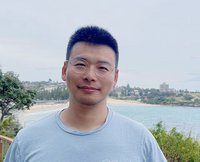
Talk
"Intrinsic Subspaces of High-Dimensional Inverse Problems and Where to Find Them"
Dr. Tiangang Cui University of Sydney • Romberg Visiting Scholar
October 17, 2024 • 16:15 - 17:15
The high dimensionality is a central challenge faced by many numerical methods for solving large-scale Bayesian inverse problems. In this talk, we will present some recent developments in the identification of low-dimensional subspaces that offer a viable path to alleviating this dimensionality barrier. Utilising concentration inequalities, we are able to identify the intrinsic subspaces from the solutions of certain eigenvalue problems and derive corresponding dimension-truncation error bounds. The resulting low-dimensional subspace enables the design of inference algorithms that can scale sub-linearly with the apparent dimensionality of the problem.
This talk will be held as part of the IWR Scientific Computing Seminar.
For further information on the HGS MathComp Romberg Program please visit the website.
Location: Mathematikon • Seminar Room A, Ground Floor • Im Neuenheimer Feld 205 • 69120 Heidelberg
IWR School 2024
"Applied Modeling of Climate-Sensitive
Infectious Diseases"
September 23-27, 2024
The IWR Summer School 2024 is an interdisciplinary event to equip early-career modeling scientists with the main concepts and methods of researching and implementing models for climate-sensitive infectious diseases. The topics include:
- Climate and disease data preparation
- Machine Learning
- Process-based modeling
- Citizen science
as well as their application to the converging global challenges: climate change and pandemics.
Target Audience
MSc. and PhD candidates as well as postdoctoral scientists and young researchers from mathematical modeling for infectious diseases disciplines.
Prerequisites
- Familiarity with python and R.
- Has a science background.
- Familiarity with ODE equations
- Knowledge of the compartmental model and machine learning is a plus.
The IWR Summer School 2024 is organized by the Climate-Sensitive Infectious Diseases lab (CSIDlab) at the Interdisciplinary Center for Scientific Computing (IWR).
Location: Mathematikon • Conference Room, Room 5/104, 5th Floor • Im Neuenheimer Feld 205 • 69120 Heidelberg, Germany
For more information and how to apply online please visit the website of the IWR School 2024.
Talk: "Journalism and AI - how do both get along with each other?"
Dr. Felicitas Mokler • Journalist in Residence 2024 at the Heidelberg Institute for Theoretical Studies (HITS)
July 31, 2024 • 16:15
The recent development of AI-based software to create texts, images or even videos has an increasing impact on the work of journalists. This talk will outline benefits as well as concerns and risks of this emerging technology for journalism.
About the speaker:
Dr. Felicitas Mokler is currently “Journalist in Residence" at HITS.
Location: Mathematikon • Conference Room, Room 5/104, 5th Floor • Im Neuenheimer Feld 205 • 69120 Heidelberg
IWR Colloquium Summer Semester 2024
"Robust Optimization Approaches for PDE-constrained Optimization under Uncertainty"
Prof. Stefan Ulbrich • Department of Mathematics, Technical University of Darmstadt
July 10, 2024 • 16:15
The consideration of uncertainty in optimization problems is an important aspect in many practical applications. In this talk we consider optimization problems with partial differential equation (PDE) constraints, where uncertainty occurs in parameters (for example material parameters, usage scenarios) as well as in the optimization variables (e.g. manufacturing tolerances). There exist several approaches to handle uncertainty in optimization, in particular stochastic optimization, probabilistic constraints and (distributionally) robust optimization.
We will focus on robust and distributionally robust optimization approaches for problems with expensive PDE-constraints. In robust optimization, relevant realizations of the uncertain variables are described by an uncertainty set and it is required that the optimization variables satisfy critical constraints for all realizations of the uncertain variables in the uncertainty set. In distributionally robust optimization one considers an ambiguity set of relevant distributions for uncertain parameters and requires that the constraints are satisfied in expectation for all distributions in the ambiguity set.
The resulting robust formulation is a semi-infinite optimization problem and can be written in a min-max form. We present various techniques how to approximate and reformulate the robust problem by using optimality conditions and duality theory in order to obtain a tractable problem. Depending on the approach, the reformulation contains conic constraints, complementarity conditions and conjugate functions. We will sketch suitable solution methods.
Moreover, we will illustrate, how adjoint techniques as well as model order reduction and error estimation can be used to solve these problems efficiently in the PDE constraint case.
We present several application examples, in particular the design optimization of electric machines under uncertainty.
The IWR Colloquium will be held as an in-person event at the Mathematikon. In addition it will be streamed via Zoom. For more information please visit the website of the colloquium.
Location: Mathematikon • Conference Room, Room 5/104, 5th Floor • Im Neuenheimer Feld 205 • 69120 Heidelberg
87. Heidelberger Bildverarbeitungsforum
"KI in der Praxis: Was geht schon, was kommt noch?"
2. Juli 2024 • SICK AG, SIA Campus • Schwarzwaldstraße 52, 79183 Waldkirch
Künstliche Intelligenz ist in aller Munde. Wenn es aber um die praktische Umsetzung für die Bildverarbeitung in der Industrie geht, ist immer noch unklar, was wirklich in der Praxis funktioniert. Damit ist es an der Zeit beim 87. Heidelberger Bildverarbeitungsforum eine Zwischenbilanz zu ziehen. Diese wird abgestimmt aufeinander unter den folgenden Aspekten durchgeführt:
- Was wissen wir heute darüber, wie KI funktioniert und was ist noch nicht bekannt?
- Wie fällt heute der Vergleich zwischen klassischen Bildverarbeitungsmethoden und KI-Methoden aus?
- Was hat sich in der Praxis in den verschiedensten Anwendungsfeldern bewährt und was nicht?
- Was können wir in naher Zukunft erwarten?
Anmeldung und weiterführende Informationen finden sich auf der Webseite der Veranstaltung:
https://www.bv-forum.de/87-bildverarbeitungsforum.html
"Machine learning galore!"
June 27, 2024 • 16:30 - 18:00
Machine learning galore will feature lab presentations by PIs as well as scientific talks by junior scientists.
- Lab presentations:
- Roland Herzog, Georgia Koppe, Anna Kreshuk
- Science talks:
- Evelyn Herberg (Herzog lab) : Optimization in Machine Learning
- Manuel Brenner (Koppe lab) : Creating digital twins of social Interaction partners
- Peter Park (Kreshuk lab): Seeing biology beyond the physics of light
To help plan the catering, please register for free by clicking here. (Deadline: June 24, 2024)
Scientific Machine Learning is a joint initiative from STRUCTURES and IWR aimed at fostering interactions within and development of the local machine learning community. Its portal, http://mlai.uni-heidelberg.de summarizes the many relevant events and news from across campus that would otherwise remain scattered across single institutions or fields.
The goals of the MLAI platform align with the STRUCTURES Cluster of Excellence's objective of driving research into the fundamental understanding of current and future machine learning, and with IWR’s aim to leverage machine learning to enable the solution of long-standing problems in the natural and life sciences, the engineering sciences, as well as the humanities.
Further information and links:
- MLAI homepage
- Machine Learning Talks on Campus – Information service and mailing list
- STRUCTURES Cluster of Excellence
Location: Mathematikon • Conference Room, Room 5/104, 5th Floor • Im Neuenheimer Feld 205 • 69120 Heidelberg
IWR Colloquium Summer Semester 2024
"Probabilistic Machine Learning and Latent Variable Models for Molecular Data"
Junior Prof. Britta Velten • Centre for Organismal Studies (COS) & Interdisciplinary Center for Scientific Computing (IWR)
June 26, 2024 • 16:15
Nowadays researchers can obtain quantitative measurements of the abundances and activities of different types of molecules across experimental conditions and spatio-temporal resolutions. In this talk, I will discuss how latent variable models can help us to extract major underlying patterns from the noisy, heterogeneous and high-dimensional data and how to accommodate the statistical properties of molecular data in such models. Case studies will demonstrate how this can help us to highlight core biological processes along development, in health and disease and pinpoint underlying molecular drivers.
The IWR Colloquium will be held as an in-person event at the Mathematikon. In addition it will be streamed via Zoom. For more information please visit the website of the colloquium.
Location: Mathematikon • Conference Room, Room 5/104, 5th Floor • Im Neuenheimer Feld 205 • 69120 Heidelberg
17. Modellierungstag Rhein-Neckar
"Optimierung und Nachhaltigkeit"
13. Juni 2024 • 14:00
Der 17. Modellierungstag Rhein-Neckar an der Universität Heidelberg findet am 13. Juni 2024 zum Thema Optimierung und Nachhaltigkeit statt.
Modelle bilden die Grundlage für quantitative Entscheidungen: Analyse, Verbesserung und Optimierung basieren auf mathematischen Beschreibungen unserer Umwelt. Der Zusammenhang zwischen Optimierung und Nachhaltigkeit zeigt sich deutlich in der effizienten Nutzung von Ressourcen und der Reduktion von Umweltbelastungen, wodurch langfristige und nachhaltige Lösungen entwickelt werden können. Beim Modellierungstag stellen Redner:innen der Universität und ihrer Partnerinstitute und -unternehmen Forschung mit Bezug zur Energieversorgung, Logistik und Hitzestressvermeidung vor.
Auf dieser Netzwerkveranstaltung der HGS MathComp Graduate School treffen Expert:innen und Wissenschaftler:innen zusammen und beleuchten gemeinsam Trends in der modellgestützten Forschung und Entwicklung aus unterschiedlichen Blickwinkeln. In diesem Erfahrungsaustausch liegt das Potenzial für zukünftige Zusammenarbeit zwischen Universität und Wirtschaft für den direkten Transfer von Forschungsergebnissen zur Prozessoptimierung und zum intelligenten Ressourceneinsatz.
Der Modellierungstag Rhein-Neckar wird von der Graduiertenschule HGS MathComp in Kooperation mit der Stadt Heidelberg und freundlicher Unterstützung von hei_INNOVATION organisiert.
Beginn: 14:00 Uhr, Check-in: ab 13:30 Uhr
Ort: Mathematikon, 5. Stock, Im Neuenheimer Feld 205, 69120 Heidelberg
IWR Colloquium Summer Semester 2024
"Dynamics and Control of Human Cognition and Behavior for Mental Health Applications"
Prof. Georgia Koppe • Interdisciplinary Center for Scientific Computing (IWR), Heidelberg University
June 12, 2024 • 16:15
Understanding and predicting maladaptive human behavior and cognition, which are pertinent to many psychiatric disorders, requires understanding their underlying dynamics and dynamical mechanisms. Modifying these behaviors requires control over their dynamics.
My group focuses on inferring the dynamics underlying human behavioral and neural time series, utilizing both process-driven and data-driven modeling approaches. Based on these methods, we develop mental health applications where dynamics are used to predict and control future system states, or to study their generative mechanisms. Our applications include: 1) Mobile apps that assess psychological ratings as proxies for mental health states, forecast changes over time, and use these forecasts to tailor mobile mental health exercises. 2) Web-based platforms in which we specifically tailor cognitive experimental paradigms to reliably assess complex decision-making. And 3) we develop and apply models for the reliable detection of neural dynamical systems features predictive of psychiatric dysfunction.
In this colloquium, I want to introduce to you the new RG and its members, along with current and future research directions.
The IWR Colloquium will be held as an in-person event at the Mathematikon. In addition it will be streamed via Zoom. For more information please visit the website of the colloquium.
Location: Mathematikon • Conference Room, Room 5/104, 5th Floor • Im Neuenheimer Feld 205 • 69120 Heidelberg
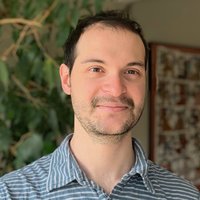
Talk
"Model scale versus domain knowledge in long-term forecasting of chaos"
William Gilpin • Assistant Professor of Physics at UT Austin, The Oden Institute for Computational Engineering & Sciences
June 6, 2024 • 15:00 - 16:30
Chaos and unpredictability are traditionally synonymous, yet large-scale statistical-learning methods have recently demonstrated surprising ability to forecast chaotic systems well beyond typical predictability horizons. I will describe my recent work evaluating forecasting methods on a large-scale dynamical systems dataset. At long forecast horizons, diverse methods—ranging from reservoir computers to neural ordinary differential equations—exhibit a universal tradeoff between inductive bias and forecast ability. In this regime, we find that classical properties like Lyapunov exponents fail to determine empirical predictability. Rather, forecast methods are limited by their ability to learn long-timescale slow manifolds associated with a system’s invariant measure. Our results inform a general view of complex dynamics as a generative process, with implications for how we construct and constrain time series models.
Organisation: Prof. Georgia Koppe • Research Group "Machine Learning Human Behavior", IWR
Location: Mathematikon • Conference Room, Room 5/104, 5th Floor • Im Neuenheimer Feld 205 • 69120 Heidelberg
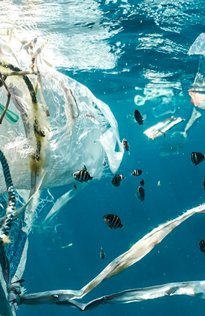
"TULIP Research-to-Policy Dialogue on Plastic Pollution, Climate Change and Antimicrobial Resistance"
5. Juni 2024 • 09:00 - 13:00
Zu dem Research-to-Policy Dialogue im Kontext des von der Europäischen Union geförderten Forschungsprojekts TULIP lädt das Climate-Sensitive Infectious Diseases Lab (CSIDlab) der Universität Heidelberg ein. Im Mittelpunkt der öffentlichen Veranstaltung stehen die komplexen Zusammenhänge und Auswirkungen von Mikroplastikverschmutzung, Klimawandel und Antimikrobiellen Resistenzen, ebenso wie mögliche Lösungsansätze. Dazu finden Expertenvorträge und eine Podiumsdiskussion statt. Für die auf Englisch durchgeführte Veranstaltung an der Universität Heidelberg ist eine Anmeldung erforderlich.
Wann: 05.06.2024 um 09:30 - 13:00 Uhr
Wo: Alte Aula, Grabengasse 1, 69117 Heidelberg
Das Event wird zusätzlich online gestreamt.
Unter folgendem Link können Sie sich für die Teilnahme an der Veranstaltung registrieren:
https://check-in.uni-heidelberg.de/heiinnovation/tulip/
Weiter Informationen finden Sie auf der Webseite der Veranstaltung.
Verantstaltungsort: Alte Aula • Grabengasse 1, 69117 Heidelberg
"Der europäische Lancet Countdown Bericht zu Klimawandel und Gesundheit 2024: Was bedeuten die Ergebnisse für Deutschland?"
23. Mai 2024 • 10:30 - 12:30
Der Lancet Countdown (LC) Europe ist eine interdisziplinäre, internationale Forschungskooperation, die anhand von 41 Indikatoren die Auswirkungen des fortschreitenden Klimawandels auf die Gesundheit in Europa untersucht - und die politischen Antworten darauf. Am 13. Mai 2024 wird der zweite Bericht mit den neuesten Forschungsergebnisse des LC Europe im renommierten Fachjournal Lancet Public Health veröffentlicht.
Die Universität Heidelberg ist Teil der LC Europe Forschungskooperation und lädt gemeinsam mit der Deutschen Allianz Klimawandel und Gesundheit (KLUG e.V.) und dem Centre for Planetary Health Policy (CPHP) zu einer Launchveranstaltung ein, auf der der neue Bericht vorgestellt wird. Gemeinsam mit Expert:innen der EU-Kommission, WHO Europe, dem Robert Koch-Institut, dem Umweltbundesamt und vielen mehr werden die zentralen wissenschaftlichen Erkenntnisse des aktuellen Berichts präsentiert und in den lokalen Kontext eingeordnet.
Seien Sie vor Ort dabei und lernen die teilnehmenden Expert:innen sowie die am LC Europe Bericht beteiligten Wissenschaftler:innen der Universität Heidelberg kennen!
Wann: 23.05.2024 um 10:30 - 12:30 Uhr
Wo: Alte Aula, Grabengasse 1, 69117 Heidelberg
Das Event wird zusätzlich online gestreamt.
Unter folgendem Link können Sie sich für die Teilnahme an der Veranstaltung registrieren:
https://csidlab.iwr.uni-heidelberg.de/lcd-german-launch-2024.html
Verantstaltungsort: Alte Aula • Grabengasse 1, 69117 Heidelberg
IWR Colloquium Summer Semester 2024
"Efficient and Robust Coupling Methods for Electro-Mechanical Models of the Human Heart"
Prof. Christian Wieners • Institute for Applied and Numerical Mathematics, Karlsruhe Institute of Technology (KIT)
May 8, 2024 • 16:15
Computational modeling of the cardiovascular system can help to understand the relevant mechanisms and help to tailor treatments for heart diseases. We introduce a fully coupled PDE system for electrophysiology and cardiac mechanics combined with ODEs of ionic concentrations, the blood pressure in the cardiac chambers and a model for the circulatory system. The model is realized in the parallel software system M++, and we show that the full model for a heart beat is scaling very well on modern HPC systems.
The IWR Colloquium will be held as an in-person event at the Mathematikon. In addition it will be streamed via Zoom. For more information please visit the website of the colloquium.
Location: Mathematikon • Conference Room, Room 5/104, 5th Floor • Im Neuenheimer Feld 205 • 69120 Heidelberg
"Machine learning galore!"
April 25, 2024 • 16:30 - 18:00
Machine learning galore will feature lab presentations by PIs as well as scientific talks by junior scientists.
- Lab presentations:
- Tobias Buck, Holger Fröning, Denis Schapiro
- Science talks:
- William Oliver (Buck lab) : Machine Learning for cosmological simulations
- Hendrik Borras (Fröning lab): Probabilistic Photonic Computing with Chaotic Light
- Miguel A. Ibarra Arellano (Schapiro lab): Finding broken cells with AI and computer vision
To help plan the catering, please register for free by clicking here. (Deadline: April 23, 2024)
Scientific Machine Learning is a joint initiative from STRUCTURES and IWR aimed at fostering interactions within and development of the local machine learning community. Its portal, http://mlai.uni-heidelberg.de summarizes the many relevant events and news from across campus that would otherwise remain scattered across single institutions or fields.
The goals of the MLAI platform align with the STRUCTURES Cluster of Excellence's objective of driving research into the fundamental understanding of current and future machine learning, and with IWR’s aim to leverage machine learning to enable the solution of long-standing problems in the natural and life sciences, the engineering sciences, as well as the humanities.
Further information and links:
- MLAI homepage
- Machine Learning Talks on Campus – Information service and mailing list
- STRUCTURES Cluster of Excellence
Location: Mathematikon • Conference Room, Room 5/104, 5th Floor • Im Neuenheimer Feld 205 • 69120 Heidelberg
Event
Lunch Time Python meets RSE* Coffee Hour
Scientific Software Center (SSC)
April 23, 2024 • 12:00 - 13:00
Python is a very popular - maybe even the most popular - programming language among developers of scientific software. One of the reasons for this success story is the rich ecosystem of available (scientific) libraries. Lunch Time Python** aims at providing a communication platform between Pythonistas to learn about new libraries in an informal setting. Sessions take roughly 30 minutes, one library is presented per session and the code will be made available afterwards. Come by, enjoy your lunch with us and step up your Python game!
The RSE coffee hour aims to bring together RSEs at all career stages! Join us for a cup of coffee and chat about challenges and strategies for developing research software.
*Research Software Engineer (RSE) = someone who develops their own software as part of their research
**https://ssciwr.github.io/lunch-time-python/
Location: Mathematikon • Conference Room, Room 5/104, 5th Floor • Im Neuenheimer Feld 205 • 69120 Heidelberg
Summer School
International Conference and Computational Science Summer School (CSSS 2024)
February 26 - March 1, 2024 • Bangkok, Thailand
International Conference and Computational Science Summer School (CSSS 2024) is hosted by Department of Mathematics, King Mongkut’s University of Technology North Bangkok (KMUTNB), Foundation for the Promotion of Mathematical Talent (Thailand), Center of Excellence in Data Science for Health Study Walailak University, and Interdisciplinary Center for Scientific Computing (IWR), Heidelberg University. The event is traditionally structured in two components which are
- A workshop on Linear and Nonlinear Optimization in Engineering February 19 - 23, 2024
The number of participants to join the workshop is limited to 50. Participant should have own laptop to maximize productivity of joining the workshop.
- A summer school on Computational Engineering and Industrial Innovation during February 26 – March 1, 2024
This year brings a noteworthy change to our usual structure. During the summer school week, we are intentionally introducing an international conference on frontier research topics. This addition aims to offer a robust platform for researchers to showcase and exchange their cutting-edge research in a diverse array of fields, including but not limited to:
- Image Processing
- High-performance Computing
- Optimization Problems
- Mathematical Modeling and Simulation
- Algorithms for Solving Discrete and Continuous Problems in Engineering
- Analysis and Visualization of Data
- Data Science and Data Analytics
- Computational Engineering and Industrial Innovation
- Other Related Areas
Location: 4th floor, Techno Park, King Mongkut’s University of Technology North Bangkok (KMUTNB), Bangkok, Thailand
IWR Colloquium Winter Semester 2023 / 2024
"Machine Learning and AI for the Sciences: toward understanding"
Prof. Klaus-Robert Müller • Director, Berlin Institute for the Foundations of Learning and Data • Machine Learning Group, Technische Universität Berlin
January 30, 2024 • 16:15
In recent years, machine learning (ML) and artificial intelligence (AI) methods have begun to play a more and more enabling role in the sciences and in industry. In particular, the advent of large and/or complex data corpora has given rise to new technological challenges and possibilities. In his talk, Müller will touch upon the topic of ML applications in the sciences, in particular in chemistry and physics. He will also discuss possibilities for extracting information from machine learning models to further our understanding by explaining nonlinear ML models. Finally, Müller will briefly discuss perspectives and limitations.
About Prof. Müller:
Klaus-Robert Müller has been a professor of computer science at Technische Universität Berlin since 2006; at the same time he is directing rsp. co-directing the Berlin Machine Learning Center and the Berlin Big Data Center and most recently BIFOLD. He studied physics in Karlsruhe from1984 to 1989 and obtained his Ph.D. degree in computer science at Technische Universität Karlsruhe in 1992. After completing a postdoctoral position at GMD FIRST in Berlin, he was a research fellow at the University of Tokyo from 1994 to 1995. In 1995, he founded the Intelligent Data Analysis group at GMD-FIRST (later Fraunhofer FIRST) and directed it until 2008. From 1999 to 2006, he was a professor at the University of Potsdam. From 2012 he has been Distinguished Professor at Korea University in Seoul. In 2020/2021 he spent his sabbatical at Google Brain as a Principal Scientist. Among others, he was awarded the Olympus Prize for Pattern Recognition (1999), the SEL Alcatel Communication Award (2006), the Science Prize of Berlin by the Governing Mayor of Berlin (2014), the Vodafone Innovations Award (2017), Pattern Recognition Best Paper award (2020), Digital Signal Processing Best Paper award (2022). In 2012, he was elected member of the German National Academy of Sciences-Leopoldina, in 2017 of the Berlin Brandenburg Academy of Sciences, in 2021 of the German National Academy of Science and Engineering and also in 2017 external scientific member of the Max Planck Society. From 2019 on he became an ISI Highly Cited researcher in the cross-disciplinary area. His research interests are intelligent data analysis and Machine Learning in the sciences (Neuroscience (specifically Brain-Computer Interfaces, Physics, Chemistry) and in industry.
The IWR Colloquium will be held as an in-person event at the Mathematikon. In addition it will be streamed via Zoom. For more information please visit the website of the colloquium.
Location: Mathematikon • Conference Room, Room 5/104, 5th Floor • Im Neuenheimer Feld 205 • 69120 Heidelberg
IWR Colloquium Winter Semester 2023 / 2024
"Computational Fluid Dynamics Frameworks for the next Decade"
Prof. Andrea Beck • Institute of Aerodynamics and Gas Dynamics, University of Stuttgart
January 24, 2024 • 16:15
In this talk, I will venture a glimpse into the future of cutting-edge numerical methods and software for computational fluid dynamics (CFD) for many aerospace applications. While established, off-the-shelf commercial solutions for a broad range of applications exist, the current push towards fundamental changes in the fields of energy generation and transport necessitates computational tools that can keep pace and facilitate discovery through computation.
This talk will give an overview of the ingredients of modern simulation software for CFD, in particular for multi-scale, multi-physics and multi-fidelity problems. Among these are high-order discretization schemes that can adapt locally in space and time to the underlying resolution requirements and thus combine accuracy and robustness. While the potential of leveraging data-driven approaches has become apparent, I advocate for a shift from a purely data-driven to a data-informed approach, which combines both machine learning models (ML) and classical solution schemes consistently. Last but not least, modern discretization methods and ML/CFD hybrid schemes must produce efficient and reliable results. For this, GPU-parallelization and an incorporation of the FAIR principles into the simulation stack must be part of the next generation CFD solvers.
The IWR Colloquium will be held as an in-person event at the Mathematikon. In addition it will be streamed via Zoom. For more information please visit the website of the colloquium.
Location: Mathematikon • Conference Room, Room 5/104, 5th Floor • Im Neuenheimer Feld 205 • 69120 Heidelberg
"Machine learning galore!"
January 18, 2024 • 16:30 - 18:00
Machine learning galore will feature lab presentations by PIs as well as scientific talks by junior scientists.
- Lab presentations:
- Tristan Bereau, Fred Hamprecht, Caroline Heneka
- Science talks:
- Tristan Bereau: Machine learning representation for molecular dynamics
- Roman Remme (Hamprecht lab): Machine Learning meets Density Functional Theory
- Lara Alegre (Heneka lab): Machine Learning for large radio surveys
To help plan the catering, please register for free by clicking here. (Deadline: January 15, 2024)
Scientific Machine Learning is a joint initiative from STRUCTURES and IWR aimed at fostering interactions within and development of the local machine learning community. Its portal, http://mlai.uni-heidelberg.de summarizes the many relevant events and news from across campus that would otherwise remain scattered across single institutions or fields.
The goals of the MLAI platform align with the STRUCTURES Cluster of Excellence's objective of driving research into the fundamental understanding of current and future machine learning, and with IWR’s aim to leverage machine learning to enable the solution of long-standing problems in the natural and life sciences, the engineering sciences, as well as the humanities.
Further information and links:
- MLAI homepage
- Machine Learning Talks on Campus – Information service and mailing list
- STRUCTURES Cluster of Excellence
Location: Mathematikon • Conference Room, Room 5/104, 5th Floor • Im Neuenheimer Feld 205 • 69120 Heidelberg
IWR Colloquium Winter Semester 2023 / 2024
"Bayesian Inference Models for Healthcare Resilience: Insights and Lessons from Mexico's COVID-19 Response"
Prof. Antonio Capella Kort • Instituto de Matemáticas, Universidad Nacional Autónoma de México
January 17, 2024 • 16:15
Navigating the challenges of the global COVID-19 pandemic required strategic decisions tailored to each country's unique circumstances. In less developed nations, the threat of overwhelming hospital capacity was especially severe. Rather than building scenarios based on mathematical models, our team used a dynamic forecasting approach. We developed a series of models that provided 4-week probabilistic forecasts, complete with uncertainty quantification. These forecasts, crucially informed by real-time data, predicted the demand for hospital beds and ventilators, which served as the backbone for decisions and public policies adopted by federal health authorities in Mexico from April 2020 to January 2022. The journey was a challenging one. An incompletely characterized virus and the unpredictable dynamics of societal behavior made crafting a useful model difficult.
In this talk, I will present a retrospective of these models and critically review their objectives, successes, and limitations. Our methodology and modeling decisions will be presented, from the intricacies of data used for model fitting to the balance between model complexity and parameter identifiability. The predictive power and performance of our models will also be reviewed. Beyond the algorithms and forecasts, I'll share our experiences collaborating with health authorities and communicating with the general public. Discover the highs and lows, the challenges faced, and the insights we gained.
The IWR Colloquium will be held as an in-person event at the Mathematikon. In addition it will be streamed via Zoom. For more information please visit the website of the colloquium.
Location: Mathematikon • Conference Room, Room 5/104, 5th Floor • Im Neuenheimer Feld 205 • 69120 Heidelberg
Talk
AMMICO, an AI Media and Misinformation Content Analysis Tool: Communication research meets software development
PD Delia Dumitrescu • Senior Researcher, Institute of Political Science, Heidelberg University & Dr. Inga Ulusoy • Research Software Engineer, Scientific Software Center (SSC)
January 12, 2024 • 13:00 - 15:00
This presentation consists of two parts and perspectives.
PD Delia Dumitrescu from social/political sciences will speak about communication research using a multi-country, multi-language data set containing COVID-19 social media disinformation posts. Delia will present the initial difficulties related to the dataset and how she approached the Scientific Software Center for support. This support resulted in AMMICO (AI Media and Misinformation Content Analysis Tool): AMMICO is a publicly available software package written in Python 3, whose purpose is the simultaneous evaluation of the text and graphical content of image files. After describing the software features, Delia will provide an assessment of its performance using the social media disinformation posts. This part will conclude by highlighting the tool’s advantages for communication research and by discussing further development ideas.
In the second part of the talk, Dr Inga Ulusoy from the Scientific Software Center (SSC) will speak about the role of the SSC in this project. The initial consultation evolved into a software development project of the SSC. Inga will describe how the project and communication was structured and how the software was designed to fit the needs of the researchers. In the end, Inga will demonstrate how AMMICO can be utilized in further research projects, and conclude by summarizing the ways the SSC can support research projects through research software development and the implementation of software engineering best practices.
This event is organized by the Heidelberg Center for Digital Humanities (HCDH) and the Scientific Software Center (SSC).
Location: Centre for Asian and Transcultural Studies (CATS), Voßstraße 2, 69115 Heidelberg
